After a week without campaigning, suspended out of respect for those mourning the death of former Breen-Phillips rector, Sister Mary McNamara, campaigning for the student body presidential reaction resumed Monday in preparation for Friday’s run-off election.
As a part of this second round of campaigning, the Knights of Columbus hosted a debate, moderated by senior Rohit Fonseca, between the remaining two presidential candidates — juniors Alex Kruszewski and Gates McGavick — Monday evening in DeBartolo Hall.
The debate, the second of this campaign, focused on issues such as sexual assault on campus, the University’s relationship with the South Bend community and closed senate meetings.
Kruszewski said he and his running mate, junior Julia Dunbar, took time to re-evaluate their platform, moving away from some of the tickets previous, big-ticket campaign platforms.
“Specifically tonight, we would like to talk to you about passions … past simply flex points and Chick-Fil-A, whatever we had talked about a few weeks ago,” he said.
Central to this refocus, Kruszewski said, was placing sexual assault prevention at the center of their platform.
Kruszewski proposed student government continue implementation of Callisto and change du Lac to better deal with sexual assault.
“Currently, du Lac doesn’t define consent for whatever reason, and that’s important because it affects victims,” he said.
McGavick also laid out his and running mate, junior Corey Gayheart’s, vision for helping to decrease sexual assault on campus.
Central to the ticket’s platform was expanding the blue light system, using “a map of crime across campus” to guide placement of new blue light stations.
This implementation, along with the rest of their platform, had to be put into place with diverse student input, McGavick said.
“I think there is an issue in that people on campus don’t necessarily feel like they understand what student government does,” he said. “One thing student government can improve is … accessibility and drawing on a diverse range of ideologies voiced around campus.”
This increased transparency was part of McGavick’s stance on the issue of closed student senate meetings, he said.
While McGavick said there are “certainly” some instances in which senate meetings ought to remain closed — specifically when immigrant students who benefit from Deferred Action for Childhood Arrivals (DACA), whose public identity could put them at future risk, speak at meetings — in many other situations, the senate needs to remain open, where it has not in the past.
“There are some situations where closed senate meetings aren’t required,” he said. “ … I think a lot of people feel shut out in the process because a lot of decisions that happened in the election have been decided being closed doors, with windows papered over.”
Kruszewski, referring back to the DACA case, said the issue of closed senate meetings had to be looked at in a broader context.
“It’s a deeper problem than transparency, it’s inclusion,” he said “ … [DACA students] were afraid to share their story, afraid to show their face because of the repercussions and the stigma that occurs in the United States and on campus.”
This message of inclusion was central to the ticket’s platform, Kruszewski said, stressing that their No. 1 priority would be the creation of a multicultural student center and pledging to try to alleviate certain systemic barriers for some students’ participation on campus.
“There are passions that are not being heard at Notre Dame,” he said.
The candidates also discussed their respective visions on how to better interact with the South Bend community.
McGavick said he not only hoped to continue the University’s close working relationship with Mayor Pete Buttigieg, but that he also wanted to expand student access to local media.
“I think we should [give students access to the] South Bend Tribune,” he said. “An easy way to understand someone else’s experience is hearing about what they’re talking about in their homes at night.”
Kruszewski, who said McGavick’s media-related proposal would be difficult to implement, said he hoped students would be more willing and able to share their skills in the local community.
“The South Bend community has a lot to offer Notre Dame students,” he said “ … Students [can use] their finance skills, their psychology skills, whatever it is and go out into the community.”
The candidates closed the debate by thanking the student body for their time and stressing what an honor it was to serve and interact with them.
“The best part of the campaign ... is going door-to-door with a pen and paper,” Kruszewski said.













